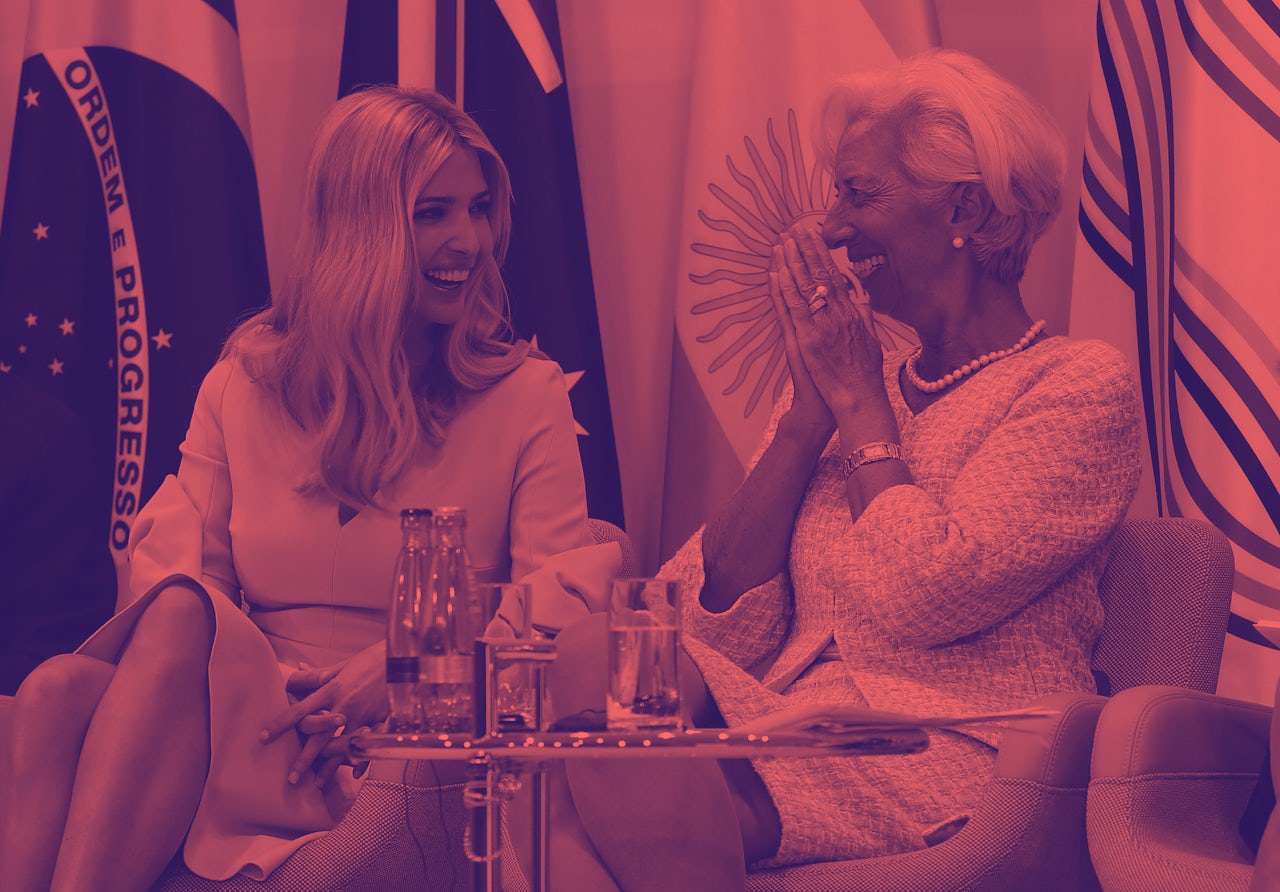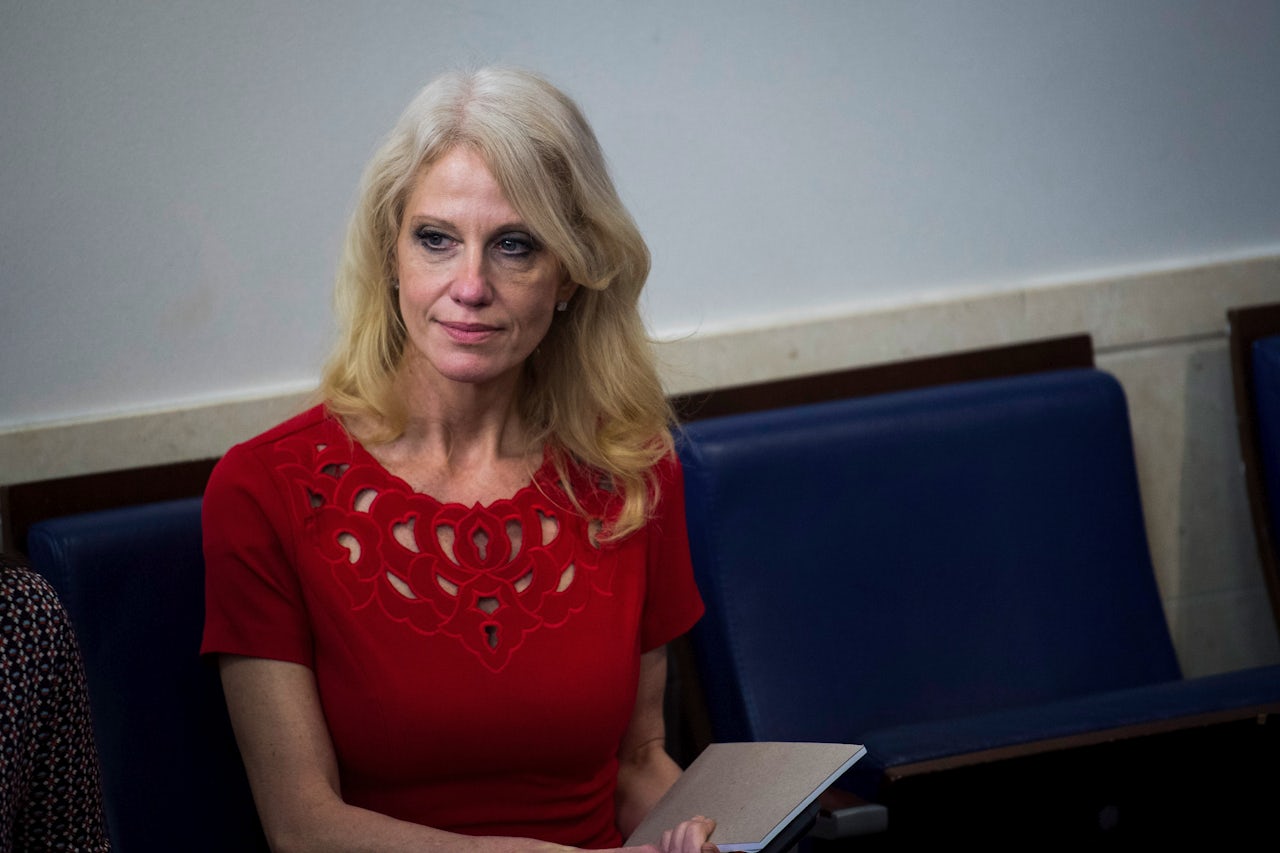No one really knows what feminism means anymore, because feminism means everything and nothing at once. According to this $26 tote bag, feminism is “the radical notion that women are people,” a definition coined by writer Marie Shear in 1986. Shear’s statement may have been radical at the time, but now it’s mostly used to sell clothing, phone cases, and the aforementioned tote bag.
Ivanka Trump has become a flashpoint for the debate around what constitutes a feminist. After she was criticized for taking her father’s seat at a G-20 meeting last weekend, David Bossie, Trump’s deputy campaign manager, claimed that self-identified feminists who dare to cast aspersions on the first daughter’s involvement in politics are hypocritical and self-serving. “These feminists are feminists in name only. They’re only feminists when it affects their checkbook,” Bossie said on Fox News on Saturday.
Bossie’s argument — that women who criticize other women are bad feminists — has become a common conservative talking point, and the feminist blogosphere almost always takes the bait in responding. Bossie and others argue that criticizing Ivanka, a powerful woman, is anti-feminist, as is excluding pro-life groups from the Women’s March. Kellyanne Conway should be lauded for being the first woman to run a winning presidential campaign, even if the administration she ushered into victory is now chipping away at women’s reproductive rights, they claim. Feminists who criticize powerful women on the right aren’t real feminists, pundits say, because they don’t blindly support all women. This week’s fake feminist was Joan Walsh, the former editor of Salon and now an MSNBC contributor, who on Sunday suggested that Ivanka’s G-20 outfit, a pink dress with bows on the sleeves, was too “girly” for the occasion.
The opinions on feminism from the left and the right are so scattershot it is difficult to make sense of them.
Writers at Mic and Romper responded to Bossie’s claim that feminists who criticized Ivanka’s unwarranted presence at a meeting on health policy in Africa were “feminists in name only” with the now-familiar argument that their problem with Ivanka isn’t that she’s a woman, but that she doesn’t have the qualifications to be at these meetings in the first place. That’s true, but we don’t really need to talk about it anymore. Anyone who thinks Ivanka should be participating in politics isn’t going to change their mind after reading about how she isn’t qualified enough to do so. After Walsh criticized Ivanka’s clothing, however, feminists (sort of) rushed to her defense. “Instead of starting a conversation about corruption and nepotism, Walsh has started one about clothes, and in the process she has reinforced old patriarchal narratives,” wrote the New Republic's Sarah Jones. “Obviously, it’s sexist to use a woman’s appearance or outfit choice to disparage her. But Walsh took it to the next level when she singled out Trump’s outfit’s overt femininity as a problem,” said VICE politics writer Eve Peyser. To their credit, these writers noted Ivanka’s support of her father’s politics, her lack of foreign policy experience, and her clothing label’s use of sweatshop labor. But they still took the bait by writing about a controversy manufactured by network news talking heads.
The opinions on feminism from the left and the right are so scattershot it is difficult to make sense of them. Women should be able to wear whatever they want without having their professional qualifications called into question, but defending Ivanka and other women in Trump’s circle from attacks on their looks is a losing game. But Ivanka’s critics, especially prominent liberal feminists who blast her for co-opting feminism to sell handbags and high heels, often ignore the fact that it was this very school of liberal feminism that paved the way for Ivanka’s Women Who Work brand.
Ivanka’s most recent book, also titled Women Who Work, is modeled after the “business book, but for women” genre that Sheryl Sandberg pioneered with Lean In. The book is aspirational: Ivanka claims it contains career advice, but only for women whose struggles include negotiating raises with their bosses and setting aside time for self-care. The book is full of vague platitudes about empowerment, like “We must fight for ourselves, not for our rights as workers, but also as women.” (Incidentally, Ivanka built her pastel-hued empire on the labor of unpaid interns and underpaid factory workers.) Ivanka may not be a feminist, but conservatives love her bland, de-politicized brand of corporate feminism.
Under this consumption-driven, corporate feminist ideology, pioneered by Sheryl Sandberg’s work-focused feminist tome Lean In, the stakes are much lower. The struggles that bubble to the surface in these are too often the ones of executives and A-list actors who want to be paid the same exorbitant wages as their male counterparts, not the two-thirds of minimum wage workers in the U.S. who happen to be women and, more often than not, mothers. Poverty is a personal problem, and professional success is achieved by working harder in a world defined by men, instead of one that identifies and respects the multifaceted job of being a woman.
This logic extends beyond the Trump orbit to the ostensibly feminist websites that market themselves to young, feminist-identifying women who want to “have it all,” like Refinery29, which recently gave Ivanka free press for her new book. (Never mind that Refinery29 and similar websites, like Bustle and its parenting site Romper, profit off their feminist readership while paying their writers substandard wages.)
In today's feminism, poverty is a personal problem, and professional success is achieved by working harder in a world defined by men.
Even when liberal feminists dare to think beyond professional success, their ideology focuses on the individual rather than the collective. In her new book, The H Spot: The Feminist Pursuit of Happiness, Jill Filipovic acknowledges that the feminist quest for “equality” still exists “in a system built by and for men, according to their own life patterns, according to their desires, and according to what makes them happy.” Filipovic’s conclusion is that feminism should take equality out of the feminist equation and instead focus on women’s happiness, on their ability to be sexually liberated beings who indulge in calorie-laden meals. In Filipovic’s ideal feminist world, women are free to consume whatever they need to make them happy. Middle class feminists’ quest for personal happiness — and their debates about whether makeup, high heels, GIRLS, and Ivanka Trump are feminist — obscures the reality that millions of women in the United States and elsewhere are struggling to survive, much less to “find their bliss.”
Feminist discourse has devolved to incessant interrogation of what is and isn’t feminist (push up bras? Ivanka? Women Who Work? Women who choose not to work?), shifting the lens away from the struggles of women, particularly those who do the grueling, behind-the-scenes work that allows Ivanka, Sandberg, and others to climb the corporate ladder. Most women don’t have a choice: they work to survive, not necessarily to feel fulfilled. And the Trump administration, which is trying to limit working class women’s access to reproductive healthcare, lower taxes for the wealthy, and chip away at labor protections, will only make their lives more difficult.

